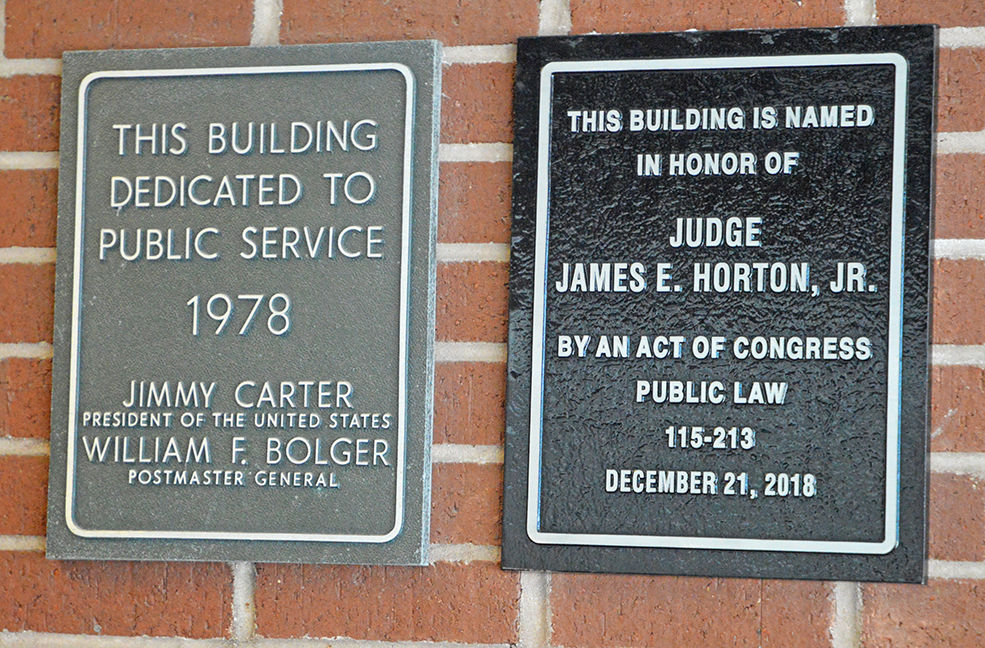Post office renamed for Judge James E. Horton Jr.
Published 6:45 am Thursday, April 25, 2019

- A plaque, which renamed the Athens Post Office by an act of Congress on Dec. 21, 2018, hangs on the wall in the post office on West Market Street.
The Athens Post Office building was officially renamed Wednesday in honor of Judge James E. Horton Jr. during a dedication ceremony.
Community, state and national leaders joined Horton’s relatives under a packed tent at the post office on West Market Street to honor the judge.
Horton issued an order in 1933 setting aside the jury’s guilty verdict and ordering a new trial for one of the Scottsboro Boys, a group of nine black teenagers falsely accused of raping two white women on a train in 1931.
Athens Postmaster James “Chris” Hill described Horton as a “distinguished gentleman.” Hill said, as postmaster, he was honored to be a part of the dedication.
Alabama District Manager Samuel E. Jaudon of the U.S. Postal Service said in 1967 Congress passed the first law to dedicate a postal facility in honor of an individual.
“Today, there are post offices across the country dedicated honoring veterans, police officers killed in action, civil rights champions, sports legends and congressional and community leaders,” Jaudon said.
Jaudon said the post office in Selma was dedicated to Amelia Boynton Robinson, a civil rights advocate and a voting rights champion.
“She, along with Dr. Martin Luther King Jr., led the famous march from Selma,” Jaudon said.
Jaudon also spoke about the Meadowbrook Post Office, which was dedicated in honor of Lance Cpl. Thomas E. Rivers Jr., a U.S. Marine killed in Afghanistan in 2010 in the line of duty.
Jaudon thanked U.S. Rep. Mo Brooks, R-5th, for championing the legislation to honor Horton and rededicate the post office. Brooks sponsored the bill that would designate the Athens Post Office as the Judge James E. Horton Jr. Post Office Building.
However, Brooks said Horton’s family and Limestone County leaders were the driving force behind the renaming.
“If not for their efforts, we would not be here today, recognizing a man who is most deserving of this honor,” Brooks said. “… Judge Horton — I think everybody can agree — was a very rare breed in the 1930s. He courageously took a stand against extreme racial prejudice at a volatile time that both risked and ended his judicial career. His story is a profile of courage.”
Brooks quoted retired Circuit Judge James “Jimmy” Woodroof Jr. concerning Horton, saying, “He never saw color. He never saw religion. He never saw anything except for doing the right thing at the right time.”
He dedicated the post office by saying, “Today, we add to the list of honors bestowed on Judge Horton by dedicating this post office in his name. For his bravery in the face of extreme racial prejudice and for his willingness to support justice that risked and ended his judicial career, Judge Horton most certainly deserves today’s honors.
“It is my sincere hope that all who will use this post office will strive to uphold Judge Horton’s noble values, fight racial prejudice wherever they may encounter it and seek the courage to do what is right no matter the consequences that may follow.”
Grandaddy Horton
Kathy Horton Garrett and other members of the Horton family were in attendance for the unveiling of the plaque honoring Horton. An emotional Garrett spoke about growing up in Greenbrier and her “Granddaddy Horton.”
She thanked the community, U.S. Postal Service and Brooks for the honor as well as gave a special thanks to Eric Snoke and John Davis. She said Snoke came up with the idea for a postage stamp, which eventually led to the idea for renaming the post office.
She said Davis worked tirelessly on both projects.
“Mr. Davis wrote an essay about Judge Horton and he included a quote of Granddaddy’s at the trial,” Garrett said. “It is as follows: ‘The world at this time and in many lands is showing intolerance and hate. It seems sometimes that love has almost deserted the human bosom. It seems that only hate has taken its place. It is only for a time gentlemen, because it is the great things in life, God’s great principles, matters of eternal right, that alone live. Wrong dies and truth forever lasts, and we should have faith in that.’”
Garrett said it was written more than 80 years ago.
“Sometimes the truth is slow to be accepted or recognized,” Garrett said. “But it is always there for someone brave enough to fight for it. Not to promote intolerance and hate … but to do the right thing.”
About Horton
Horton was born Jan. 4, 1878, in Limestone County. Despite having no formal education until he was 8 or 9 years old, Horton was accepted to Vanderbilt University’s medical studies program and later to Cumberland University, where he earned his bachelor’s and law degrees.
Horton served in the Alabama Legislature until he took a Limestone County, Alabama, chancery court position. Thereafter, he was elected circuit court judge for Alabama’s Eighth Judicial Circuit. After re-election to a second term, Judge Horton was appointed to preside over the retrials of the highly controversial Scottsboro Boys cases.
The cases involved nine African-Americans, ages 13 to 20, accused of raping two white women on a train in 1931 as it traveled through Scottsboro and Jackson County. In the first trials, eight of nine defendants were found guilty and sentenced to death in verdicts that were later reversed by the U.S. Supreme Court.
After a guilty verdict and death sentence during the second set of Scottsboro Boys trials, Horton set aside the jury’s guilty verdict and ordered a new trial for Haywood Patterson. In 2013, three of the Scottsboro Boys received posthumous pardons.
A life-size statue of Horton and a historical marker were erected in October 2017 on the Limestone County Courthouse Square.





